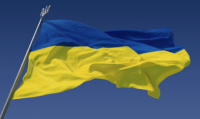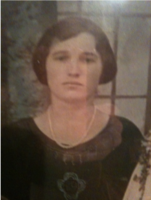Soul Heritage
![]()
I’m praying for the Ukrainian nation where last century’s atrocities want to barge into this century. I pray we learn from history! In honor of my Ukrainian roots, I’m sharing a small tribute I wrote a few years ago to my paternal grandmother who fled from Ukraine over a hundred years ago as a 16 year-old!

“There is no success without sacrifice. If you succeed without sacrifice it is because someone has suffered before you. If you sacrifice without success it is because someone will succeed after.”
Adoniram Judson
With the arrival of our first grandchild in the year of 2019, I’m being drawn to the past and to the future. I’m zooming out to take a look at this phenomenon called life. My little part, my story, is a drop in a huge generational wave of people who have gone before, of whose lives I am somehow a benefactor. What do we need to learn from the vast humanity that went before us? Who do we need to “meet” from our pasts? Will those who come after us, learn from us? Will they realize how we struggled to find our way and prayed for them to find the Way?
I’m intrigued with my grandparents and how little I know of them. It was a different and distant world they occupied compared to now. I’m especially drawn to my paternal grandmother, Baba, we called her, for the fleeting moments we knew her. So young she took on a new world, a new identity, an incredible adventure along with the certain hardship and suffering of an immigrant.
Having lived most of my adult life on the side of the world she came from, I gasp in relief that she left when she did, seeing now the aftermath of the soul-draining and humanity-stripping life brought about by communism. I live among them in the leftovers and rubble of an ideology gone bad.
This is a small tribute to Mary Hutsko who came to the USA from the Ukraine in 1911 at the age of sixteen.
“In the last quarter of the nineteenth century, mass emigration was also taking place from western Ukraine to the Americas. Rural overpopulation, poverty, malnutrition, a high mortality rate, and unemployment were among the factors that precipitated outmigration at that time. Also, at work were pull factors, including stories of great economic opportunities in the West – often exaggerated by the shipping agents who recruited immigrants, primarily for work in Pennsylvania’s coal mines.”
“The emigrants, predominantly poor peasants and young single people, hoped to earn enough money to pay for the voyage and all their existing debts, and to save enough to return to Ukraine, buy land, and establish themselves as farmers. Later, most emigrants expected to settle permanently in the United States…
Meanwhile, the immigration policies of the host countries at that time were liberal since labor was in great demand for industry in the United States.” “Even in their own homeland they fought hard to preserve their native language, religious beliefs, customs and traditions that were constantly being threatened by foreign domination.”
Ukrainian immigration: A Study in EthnicSurvival* Ann Lencyk Pawliczko United Nations Population Division
https://onlinelibrary.wiley.com/doi/pdf/10.1111/j.2050-411X.1994.tb00104.x
I imagine her
with the fascination of a young girl, along with the terror of heading across an ocean she knew nothing about, arriving at the port, stepping tremblingly aboard the crowded steerage of the ship with who-knows-what kind of provisions. Fleeing demise, dreaming of dignity, perhaps she was full of hope and fearful courage, at the same time carrying the disillusionment of life as it was. She had no idea the sacrifice and battering that life would bring; the grind and seeming futility.

“Before World War I, 98 percent of Ukrainians settled in the northeastern states, with 70 percent in Pennsylvania.” Read more: https://www.everyculture.com/multi/Sr-Z/Ukrainian-Americans.html#ixzz5lvXegwkM
Landing at the inspection station of Ellis Island, as exhilarating as it might have been, surely had its cold stares and strange languages to face. Some were sent back upon arrival. I wonder how long she had to wait, what kind of welcome she had, what prejudices and anxieties she had to push through.
I’m told she worked as a nanny for a while, then married. Life was grueling, and work for my grandfather in the coal mine was abusive. My father, the tenth child, doesn’t remember a conversation with his father who died young of black lung disease. He worked twelve hours a day in the mines of Eastern Pennsylvania and smoked a pipe after work at night. Their lives were completely poured out for the next generation.
Although my grandparents were distant and mystery to me, I want to thank them. Though is seems trite, I want to tell them it was worth it. Surely, they had hopes and dreams and capabilities. They certainly accomplished much having inaugurated life in a new land; having unobtrusively survived the Great Depression. But the seeds of their personal aspirations were regretfully buried in the soil of the future, watered with unseen tears. Look at what they started! Look at what has become because they braved the voyage into the luring and looming unknown! A diverse wave of Ukrainian and half-Ukrainian descendants. Those seeds cracking, bursting, sprouting and fruitful in their children, grandchildren and great grandchildren. But they didn’t get to see it.
Atrocities and hidden history still peek out of fragmented lives here in the post-Soviet rubble; betraying underlying thought patterns amid floundering newfound freedoms. I’m sure there was silent suffering in our grandparents. The past stays with us for a long time. It’s in our bones and our DNA, but it will soon be a distant memory. I wish I knew more. What will my grandchildren know of me in 100 years?!
When I asked some relatives what her life might have been like, my cousin replied “What do you think it was like?! She had 10 kids!?” 🙂 I’m told she loved to cook and garden and I understand church was a big part of their community life. How much we have gained from these unknowing valiant ones! They paved a way for us to live our lives as they wished they could have lived theirs. Let’s not forget that.
Jackie (Hutsko) Scott
“Children are the living messages we send to a time we will not see.”
Neil Postman




